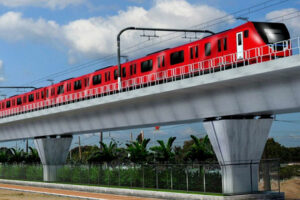THE Asian Development Bank (ADB) has approved up to $4.3 billion in loans to finance the construction of the South Commuter Railway Project.
The railway runs for nearly 55 kilometers (km), and will connect Metro Manila with Calamba, Laguna. The project is part of the North-South Commuter Railway (NSCR) network, and is the ADB’s largest infrastructure financing project to date.
After its construction, the South Commuter Railway is expected to offer fast public transport, ease road congestion, and contribute to the reduction of greenhouse gas emissions. It will also halve the travel time between Manila and Calamba from the 2.5 hours it would usually take by road.
“The South Commuter Railway Project will provide affordable, safe, reliable, and fast public transport for commuters,” Ahmed M. Saeed, ADB Vice-President for East Asia, Southeast Asia, and the Pacific, said.
“This project represents ADB’s biggest infrastructure investment and reflects our commitment to helping the Philippines attain its goals of reducing poverty, improving the lives of Filipinos, and achieving green, resilient, and high economic growth,” he added.
The project will involve the construction of 18 stations, with provisions for accessibility to the elderly, women, children, and people with disabilities.
The line will connect to the future Metro Manila Subway system.
“The South Commuter Railway Project will be financed under a multitranche financing facility, with the first tranche of $1.75 billion to be made available starting this year,” the ADB said.
The second and third tranche releases are expected in 2024 and 2026, respectively. The ADB will finance civil works for the railway viaduct, stations, bridges, tunnels, and depot buildings. The Japan International Cooperation Agency is also co-financing the loan, funding railway vehicles and railway systems.
The NSCR, which also includes the ongoing construction of the Malolos-Clark line, is expected to generate more than 35,500 jobs during construction, while providing another 3,200 permanent jobs during its operation.
The ADB’s study on the South Commuter Railway Project found that cities and municipalities that have stations along the line will have access to more than 300,000 jobs on average, an average increase of 15.3% in the cities to the south of the capital, with the corresponding growth seen at 8.5% in Metro Manila.
“It will create a substantial growth multiplier effect in the economy through supplier contracts and new opportunities opened with better connectivity in the region,” the ADB said. — Tobias Jared Tomas
